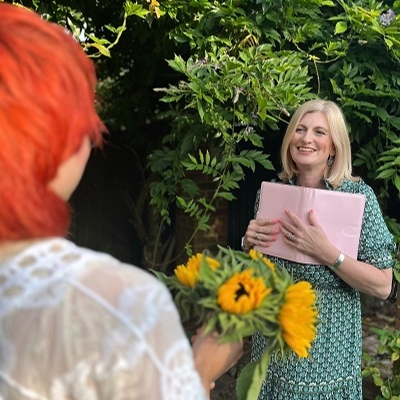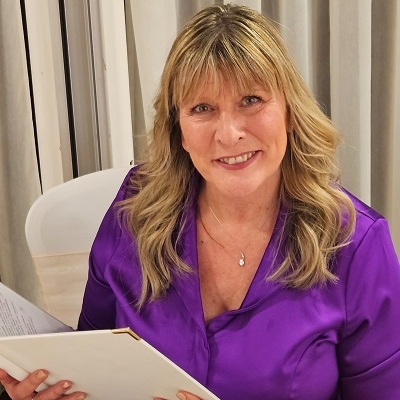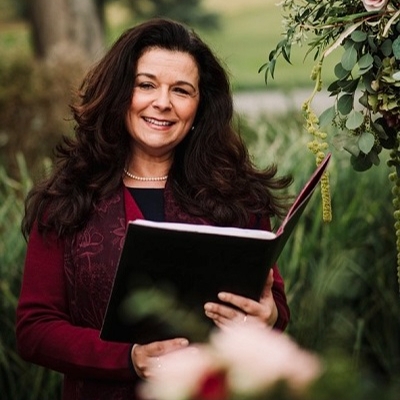Here is a selection of Q&As from Your Herts and Beds Wedding magazine whether it be about flowers, hair and makeup, fashion, wedding themes, health & beauty, cakes, stationery, legal advice. If you would like your question answered by our experts, please email it to editor@yourhertsbeds.wedding
To view more expert advice on a different topic, please select one from the list below.

Exchanging Vows
| Q | How can we ensure we choose the right wedding celebrant? |
| A | Sharon Allam says: The keywords for choosing the right celebrant are comfort and style. Start with a little research. Check out potential celebrants' social media profiles. An Instagram or TikTok page can reveal a lot about their vibe, personality and how they connect with couples. This can give you a good feel for whether they're the right fit for you. Next, consider communication. Your celebrant will be the one to share your love story, so you'll want someone who listens to your vision, works with your ideas and brings their own to the table. Most celebrants offer free, no-obligation chats. Pay attention to how you feel during the conversation. Do you feel at ease? Can you laugh together? Trust your gut – if it feels right, it probably is! Also, consider whether a celebrant fills you with confidence. Not only will an experienced officiant help ease any pre-wedding jitters, but they will be a friendly, reassuring face on the big day. Plus, they'll liaise with other suppliers to ensure everything runs smoothly. Remember, choosing a wedding celebrant should be the start of a delightful journey, not a daunting task. With a bit of research and a sprinkle of intuition, you'll discover the perfect celebrant to help you say, "I do!" |
Sharon Allam, Sunflower Ceremonies

Moments That Matter
| Q | Our wedding planner has suggested we hire a celebrant for our big day, but we're not sure what there role is. Should we book one, and what are the benefits? |
| A | Debra Massey says: The use of celebrants in 2024 is already a top wedding trend—and for good reason! If you require a civil ceremony but want bespoke content telling your love story your way, then a celebrant is the best option. Humanist celebrants offer non-religious content, but civil celebrants like me will embrace world faiths, multicultural and inclusive content as well as non-religious content according to preferences. It enables your wedding celebration to happen whenever, wherever—and indeed, however you want it to happen. A celebrant brings creativity to your bespoke ceremony at home, at a venue (licenced or otherwise), on a beach, in a woodland or under the stars. Building this around your own love story, the qualified celebrant is well equipped to celebrate that journey with unique, personal details agreed upon with you. Music, readings and draft scripts enable you to create that perfect outcome. Guest participation can include responses, a toast mid-ceremony or a lively activity! Symbolic actions such as sand ceremonies or handfasting can reaffirm the vows made and include others present through visually powerful and deeply meaningful content. Although this is being discussed positively in Parliament now, the celebrant cannot legally marry you – but don't let that deter you! The cheapest option is to attend your registry office with two witnesses beforehand, saving special wedding outfits, vows and rings for your celebrant-led occasion. Some marry overseas legally and return to celebrate with family and friends using celebrants, whilst other couples choose a licensed venue and have a registrar for the legal part of the process, handing over to the celebrant for the 'main event'. A celebrant ensures there's no one-size-fits-all. Perhaps the question couples need to ask is, why wouldn't you choose a celebrant-led wedding? |
Debra Massey, Hand On Heart Celebrant

Planning SOS
| Q | We've just started wedding planning, and I'm slightly confused about what a celebrant does! Can you help? |
| A | Charlotte Roscow says: n a registrar-conducted civil wedding ceremony, you won't have any say over important elements of the wording. For instance, you might not be religious but a family member would like a prayer included, which isn't permitted in a council-conducted wedding ceremony. Or perhaps you wanted to include elements of two religions you follow. In addition to this, offices in town halls aren't always to everyone's tastes, so many people choose a venue of their own. Booking a council registrar to the chosen venue can seriously limit the dates or times you had in mind. Plus, you likely won't meet the person conducting your wedding ceremony; it will be whoever from the local authority is available on the day's rota. By choosing a celebrant, you control who conducts your ceremony for a full planning meeting before the big day. You can also speak several times to create the perfect ceremony that's personal to you both. |
Charlotte Roscow, Charlotte Roscow Civil Ceremonies